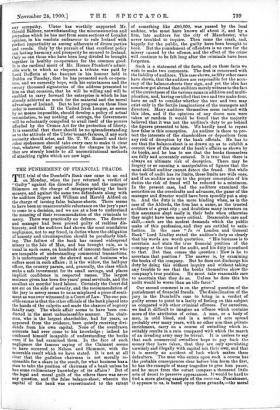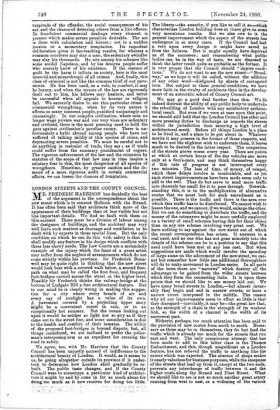THE PUNISHMENT OF FINANCIAL FRAUDS. T HE trial of the Dumbell's
Bank case came to an end on Monday, when the jury returned a verdict of "Guilty" against the director Nelson and the manager Shimmon on the charge of misappropriating the bank moneys, and against the same two defendants along with the auditors Rogers and William and Harold Aldred on the charge of issuing false balance-sheets. There seems to have been an unaccountable reluctance on the jury's part to come to a decision, and we are at a loss to understand the meaning of their recommendation of the criminals to mercy. There was practically no defence. The director and manager had been proved guilty of reckless dis- honesty, and the auditors had shown the most scandalous negligence, not to say fraud, in duties where the obligation of honesty and circumspection should be peculiarly bind- ing. The failure of the bank has caused widespread misery in the Isle of Man, and has brought ruin, as is usual in such cases, on hundreds of innocent families who are incapable of understanding commercial transactions. It is unfortunately not the shrewd man of business who suffers most in such affairs ; it is the widow, the half-pay officer, the country parson, and, generally, the class which seeks a safe investment for its small savings, and places implicit confidence in respected names. The largest sentence given has been five years' penal servitude, and the smallest six months' hard labour. Certainly the Court did not err on the side of severity, and the recommendation of the jury to mercy seems to us as misplaced a piece of senti- ment as was ever witnessed in a Court of Law. The one pos- sible excuse is that the other officials of the bank played into the hands of the culprits and made the chances of roguery fatally easy. The whole affair seems to have been con- ducted in the most unbusinesslike manner. The chair- man, who is the largest shareholder, had for years, as appeared from the evidence, been quietly receiving divi- dends from his own capital. None of the overdrawn accounts had ever come to his knowledge ; indeed he confessed himself incapable of understanding the books even if he had examined them. In the face of such negligence the famous saying of the Claimant seems to have occurred to Nelson and Shimmon, with the miserable result which we have stated. It is not at all clear that the guileless chairman is not morally re- sponsible for a share in the result, for what business has a man to take the position of chairman of a bank unless he has some rudimentary knowledge of its affairs ? But of the legal and moral guilt of the others there was never any question, and the false balance-sheet, wherein the capital of the bank was overestimated to the extent of something like £80,000, was passed by the local auditor, who must have known all about it, and by a firm, late auditors for the city of Manchester, who never troubled to inquire. Then came the crash, and, happily for the public, the guilty have been brought to book. But the punishment of offenders is no cure for the misery caused by the offence, and the effect of the crime will continue to be felt long after the criminals have been forgotten.
Such is a statement of the facts, and on these facts we wish to make two comments. The first is concerned with the liability of auditors. This case shows, as fifty other cases have shown, that the auditors are responsible for the accu- racy of the balance-sheets they sign, and yet the idea has somehow got abroad that auditors merely witness to the fact of the correctness of the various sums in addition and multi- plication, and, having certified that two and two make four, have no call to consider whether the two and two may exist only in the fertile imaginations of the managers and directors. Many auditors themselves seem imbued with this idea, and if the opinions of any dozen men were taken at random it would be found that the majority believed that it was not the auditor's duty to go behind the figures presented to him. We hardly need to repeat how false is this conception. An auditor is there to pro- tect the interests of the shareholders or depositors from any risk of deception by the bank officials. He has to see that the balance-sheet is so drawn up as to exhibit a. correct view of the state of the bank's affairs as shown by its books, and he has to see that the books themselves are fully and accurately entered. It is true that there is always an ultimate risk of deception. There may be forgery or so cunning a manipulation of figures that the most skilled auditor cannot detect the fraud. But while the task of audit has its limits these limits are wide ones, and if an auditor acts up to the proper conception of his duties the risk of fraud will be reduced to a minimum. In the present case, had the auditors examined the securities on the overdrafts and advances, the game of the manager and director would have been speedily put a stop to. And the duty is the more binding when, as in the case of the Aldreds, the firm has a name, as the trusted auditors of a great city ; and doubtless many investors on this assurance slept easily in their beds when otherwise they might have been more critical. Reasonable care and skill,—such are the modest demands which the public make of this profession, and they are entitled to satis- faction. In the case "In re London and General Bank" Lord Lindley stated the auditor's duty so clearly that his words are worth quotation. "His business is to ascertain and state the true financial position of the company at the time of the audit, and his duty is confined to that. But then comes the question: How is he to ascertain that position ? The answer is, by examining the books of the company. But he does not discharge his duty by doine, this without inquiry and without taking any trouble to see that the books themselves show the company's true position. He must take reasonable care to ascertain that they do so. Unless he does this his audit would be worse than an idle farce."
Our second comment is on the general question of the punishment of financial frauds. The disinclination of the jury in the Dumbell's case to bring in a verdict of guilty seems to point to a laxity of feeling on this subject as compared with other criminal offences. For ourselves, we find it difficult to imagine an offence which contains more of the attributes of crime. A man, or a body of men, in cold blood, and in a series of acts spread probably over many years, with no other aim than private enrichment, carry on a course of swindling which in- evitably results in a ruin compared with which the march of an invading army may be trivial. It is useless to say that such commercial swindlers hope to pay back the money they have taken, that they are only speculating unwisely and illegally with capital not their own, and that it is merely an accident of luck which makes them defaulters. The man who enters upon such a course has the probable consequences clear before him from the first, he has the example of many tragedies to give him pause, and he must from the outset compass a thousand little acts of deceit to preserve appearances. It would be hard to find a more glaring example of the mens rea. Punishment, it appears to us, is based upon three grounds,—the moral turpitude of the offender,' the social consequences of his act, and the chance of deterring others from a like offence. In fraudulent commercial dealings every element is present which makes severe penalties desirable. The act is done with calculation and leisure ;- not in a sudden passion or a momentary temptation. Its impudent deliberation gives it far-reaching results, for whereas a common murderer may slay a man, the sedentary swindler may slay his thousands. He sits among his schemes like some sordid Napoleon, and by his designs people suffer who scarcely know of his existence. If the essence of guilt be the harm it inflicts on society, here is the most unsocial and misanthropic of all crimes. And, finally, this class of criminal is not like the common thief of our pave- ments. He has been used, as a rule, to comfort, it may be luxury, and when the terrors of the law are rigorously dealt out to him, his fellows may hesitate, and terror be successful when all appeals to honour or religion fail. We earnestly desire to see this particular crime of commercial wrongdoing, when by its very nature it affects so many innocent people, punished unsparingly and unceasingly. In our complex civilisation, where men no longer wage private war and our very vices are sedentary and civilised, there is the most pressing need to hold the gate against civilisation's peculiar enemy. There is un- fortunately a habit abroad among people who have not suffered of talking mildly of this species of crime, and deprecating severe penalties. We must be careful not to do anything in restraint of trade, they say ; as if trade could suffer from the summary punishment of rogues. The vigorous enforcement of the law and the extension by statutes of the scope of that law may in time inspire a salutary fear in this, the most dangerous of all species of wrongdoers. Meantime, by greater caution and the de- mand of a more rigorous audit in certain commercial affair, we can lessen the chances of temptation.











































 Previous page
Previous page